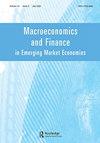The endogeneity of monetary policies of emerging market economies
IF 1.1
Q3 ECONOMICS
Macroeconomics and Finance in Emerging Market Economies
Pub Date : 2023-09-18
DOI:10.1080/17520843.2023.2258689
引用次数: 0
Abstract
ABSTRACTWe analyse the responses of the monetary policy of five (Brazil, Chile, Mexico, India, and South Africa) emerging market economies (EME) to domestic and external (U.S.) shocks. We argue that the domestic policy rate is sensitive to risk premiums, financial markets, and the world economy, showing that Taylor’s Rule can benefit from the inclusion of these variables to understand the behaviour of the monetary authority. Therefore, our results suggest the following: i) policy rates are affected by risk premiums, ii) domestic monetary policy is affected by exchange rates, stock markets, and the U.S. and iii) there is heterogeneity in the factors explaining the behaviour of central banks.KEYWORDS: Monetary policypolicy raterisk premiumEmerging market economiesGVARJEL classification: E52E32E37F47 Disclosure statementNo potential conflict of interest was reported by the author(s).Data availability statementThe data supporting the findings of this study are available from the corresponding author upon reasonable request.Additional informationFundingThis research did not receive any specific grants from public, commercial, or non-profit agencies.Notes on contributorsLuccas Assis AttílioLuccas Assis Attílio, Professor of Economics at the Federal University of Ouro Preto (UFOP). Ph.D. in Economics at the University of São Paulo (USP).新兴市场经济体货币政策的内生性
摘要本文分析了五个新兴市场经济体(巴西、智利、墨西哥、印度和南非)的货币政策对国内和外部(美国)冲击的反应。我们认为,国内政策利率对风险溢价、金融市场和世界经济敏感,表明泰勒规则可以从纳入这些变量中受益,以理解货币当局的行为。因此,我们的研究结果表明:1)政策利率受到风险溢价的影响;2)国内货币政策受到汇率、股票市场和美国的影响;3)解释央行行为的因素存在异质性。关键词:货币政策政策风险溢价新兴市场经济体gvarjel分类:E52E32E37F47披露声明作者未报告潜在利益冲突。数据可得性声明支持本研究结果的数据可根据通讯作者的合理要求提供。本研究没有收到来自公共、商业或非营利机构的任何特定资助。作者简介:lucas Assis AttílioLuccas Assis Attílio,欧鲁普雷图联邦大学经济学教授。圣保罗大学(USP)经济学博士学位。
本文章由计算机程序翻译,如有差异,请以英文原文为准。
求助全文
约1分钟内获得全文
求助全文
来源期刊
CiteScore
2.40
自引率
7.70%
发文量
23

 求助内容:
求助内容: 应助结果提醒方式:
应助结果提醒方式:


